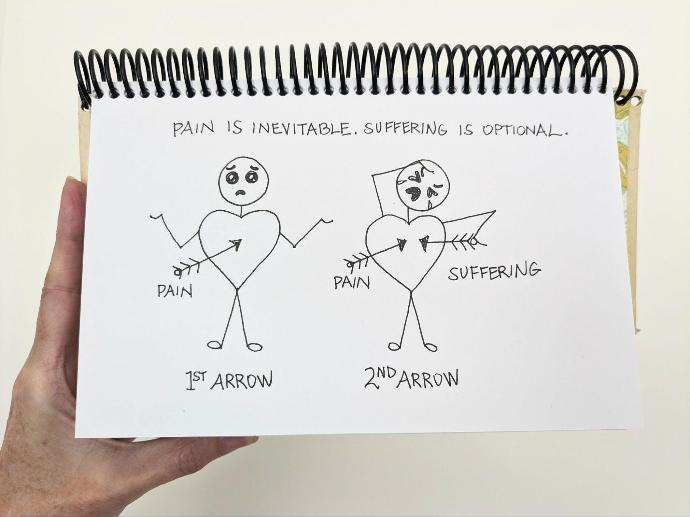If you like my posts, please sign up for my less junk, more joy newsletter and get more peace, joy, and purpose delivered right to your inbox.
Hello Mistletoe,
It’s the most wonderful - and potentially worrisome - time of the year! With jolly high expectations and gelt-y pleasures intertwined with conflict and chaos.
'Tis the season, it seems, to feel overwhelmed, stressed, or even guilty for enjoying life in the midst of so much uncertainty.
It's no wonder our inner critic shifts into overdrive during the holidays with comparisons and self-judgement around all the ways we might be falling short of creating the "perfect" holiday experience.
We may even convice ourselves that we don't deserve happiness with so much suffering in the world.
In subtle and not so subtle ways, we tend to beat ourselves up for our perceived shortcomings, making life - and the holidays - more stressful than they need to be.
I don’t want that for you. Or me. Or anyone else.
THE GOOD NEWS:
By cultivating awareness and practicing self-compassion, we can turn down the volume on negative thoughts and give ourselves permission to truly savor the season with our loved ones. In doing so, we naturally inspire others to blossom, too - and our collective joy can transform not only our lives, but also the world around us.
Remember, our joy isn't selfish indulgence, it's a guiding light that can brighten the world around us.
Next up: the Tale of Two Arrows, which highlights how we can make life a little easier by steering clear of unnecessary suffering.
* * *
The Tale of Two Arrows
Once upon a time, a woman came to see the Buddha. She was very overwhelmed and anxious.
The Buddha sat quietly and listened to her story.
She cried, “Oh, I’m completely stressed over the problems in my life - and the chaos in the world. I can’t stop worrying - and no matter how much I do, it’s just never enough.”
She asked the Buddha to help her make sense of it all.
The Buddha listened wholeheartedly and asked, “Tell me, dear one. If you were walking through the forest and someone shot an arrow at you - without any warning - would it be painful?”
“Yes!” She replied.
He continued, “What if, as you were about to tend to your wound, you were then struck by a second arrow - in the same place where the first arrow hit. Would that be 2x - or 10x - maybe even 100x more painful?”
The woman replied, “Oh yes, the second arrow would be unbearable!”
The Buddha explained that the first arrow represents the unavoidable painful experiences that life throws our way. The things we can’t control. Like getting sick, family drama, losing a job, and all the other difficult events that are a natural part of being human.
The second arrow, on the other hand, is self-inflicted.😮
It symbolizes our negative reaction to the pain of the first arrow which creates layers of unnecessary suffering.
This includes all the mental and emotional distress that arise as we get carried away with blaming, shaming, judging, and criticizing ourselves and others. Hello, inner-critic!
Sometimes, this spirals into anger, frustration, depression, and even hatred.
While we're all subject to the first arrow - it's a part of the human experience - we can avoid shooting the second arrow by caring for ourselves with kind attention and self-compassion. When painful things happen, rather than reacting with harsh criticism and judgement, we can choose to be kind to ourselves.
The woman felt a deep sense of relief flow over her.
Feeling empowered with a deeper understanding of her own pain and suffering, she realized that while she can’t always avoid the challenges and difficulties that life presents, she can control how she responds and reduce unnecessary suffering.

* * *
Pause
Now that we understand the power of our reactions to life's challenges, let's ponder how our joy, or lack thereof, influences our well-being.
What is your default response when things don't go your way? Like when you miss that deadline, get sick, or fall short in some way . . . with relationships, work, in the world? Or you wake up in a funk - feeling sad, anxious, or worried - when you "should" be feeling good.
What happens?
Can you notice how your thought patterns and mood color your day?
How long does it take before your inner-critic shows up?
Do you find that your emotions sometimes hijack your well-being?
What would your life be like if you weren't so hard on yourself? If you didn't believe all the stories your inner-critic tells you?
Hey, no judgement here. I’ve been there, done that.
And it’s not our fault. It’s part of our ancient wiring, the ole fight-flight-freeze response doing it's best to protect us.
And yet, there are better ways to care for ourselves.
“When we respond by blaming ourselves for these already painful feelings, we’re shooting the second arrow. As we awaken compassion for ourselves and release shame and self-judgment, we free ourselves from this suffering and heal our hearts.” - Tara Brach
So rather than amplifying your suffering by dwelling on negative thoughts, can you set an intention to simply notice? And hold whatever feelings arise with some kindness, avoiding that second arrow - or at least minimizing its impact.
The big take-away of the Tale of Two Arrows is that pain is an inevitable part of life, but our suffering is optional. It encourages us to cultivate mindfulness so we can acknowledge our emotions and thoughts with a more nurturing attitude towards ourselves and others.
This eases our suffering and gives us greater peace of mind so we can redirect our energy into something more useful.
* * *
Give it a Try
To create more joy this holiday season:
- Set a holiday intention to pause and meet each moment with kindness and wonder instead of judgement and criticism of yourself and others.
- Remember there’s no such thing as the “perfect” holiday. Purpose and playfulness are more memorable than perfection.
- Stay curious about what comes up for you when things don’t go your way. Can you experiment with ways to coach your inner critic through disappointments using curiosity and self-compassion instead of judgement and shame? The heart of this training is to be kind to yourself no matter what comes your way.
- Prioritize your self-care and repeat after me, “Self-care is not selfish. It’s a gift I give myself and everyone around me.” You, my dear, are your #1 priority. While everyone else’s happiness is not your responsibility, you can model it for them.
- Instead of focusing on what’s missing - or what’s going wrong - turn your attention to what’s going right and channel your gratitude in that direction. Gratitude is an antidote to negative emotions.
- Ask for help. Even Santa has helpers.
* * *
A Gift for You
Because I wholeheartedly beleive that the world can always use more joy, I've created a special Joy and Gratitude meditation for you. It's designed to help calm your mind and nurture feelings of well-being within yourself and sharing that positivity with the world. You can click here and listen on the Insight Timer app. It's free.
I'd love to hear from you, so please share how you're feeling - and what your thoughts are on all of this. You can comment below or drop me a line here.
CHEERS to giving yourself a little extra grace not only this holiday season but throughout the New Year and beyond!
Happy Holidays!
With love and gratitude,

P.S. If you’re having trouble coaching your inner critic, I’m always here to help. You can send me an email or book a free discovery session here.